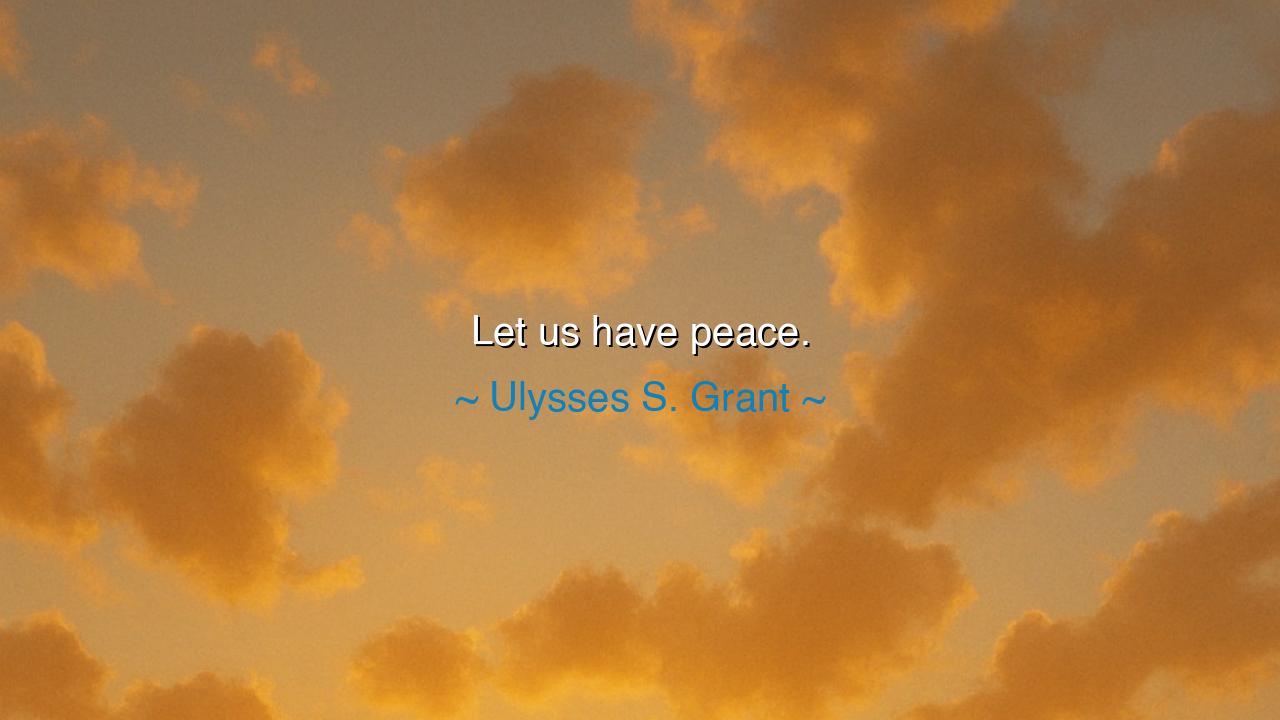
Let us have peace.






Hear the solemn cry of Ulysses S. Grant, victor of war and servant of a broken nation, who declared with the weight of history upon his lips: “Let us have peace.” These words, simple in form yet thunderous in meaning, were spoken at the close of one of the bloodiest conflicts in human memory—the American Civil War. They are not the words of one who rejoices in conquest, but of one who has seen too much blood, too much ruin, too much sorrow. They are the plea of a soldier weary of destruction, a general who became a president, asking his people to lay down hatred and rebuild their nation upon the foundations of reconciliation.
For Grant knew what many forget: that the end of war is not the end of conflict. When armies disband and cannons fall silent, the poison of division still lingers in the heart. His call—“Let us have peace”—was not only to stop fighting with weapons, but to stop fighting with words, with bitterness, with vengeance. It was a call for unity, a reminder that no nation can endure when its people remain enemies to one another. Peace, for Grant, was not merely an absence of battle—it was the presence of brotherhood, the healing of wounds, the beginning of a new covenant.
Consider the weight of his life’s path. Ulysses S. Grant rose from obscurity, endured failure, and then led the Union Army to victory. He saw soldiers fall by the thousands, fields drenched with blood, families torn apart. Yet at Appomattox, when Robert E. Lee surrendered, Grant showed not cruelty but mercy. He offered generous terms, allowing Confederate soldiers to return home with dignity. It was the first great act of his philosophy—peace over vengeance, healing over triumph. Thus his later words were born of lived truth: he had already practiced peace when the sword was in his hand.
History gives us many echoes of this wisdom. Think of Abraham Lincoln, who just before his death called for “malice toward none, charity for all.” Or think of Nelson Mandela, who, after years in prison, could have called for revenge but instead urged reconciliation, binding a fractured South Africa together with forgiveness. In each of these, as with Grant, the greatness lies not in the power to destroy, but in the power to heal. True strength is not shown in conquest, but in the willingness to build peace when war has ended.
Yet let us not think peace an easy gift. It is far easier to hate than to reconcile, far easier to demand revenge than to forgive. Grant’s words call us to a harder path, one that demands humility, patience, and courage. For peace requires sacrifice of pride, laying aside grudges, and opening hands that once clenched in fists. But this is the only path that leads to enduring greatness. Without peace, nations fall into endless cycles of division; with it, they rise into a future where prosperity is shared by all.
The lesson for us, O seekers of wisdom, is clear: in our homes, in our communities, in our world, let us echo Grant’s cry. When conflict arises, seek not to triumph but to reconcile. When wronged, resist the temptation of vengeance; instead, sow the seeds of forgiveness. In moments of division, remember that peace is not weakness but strength—the strength to build rather than destroy, to heal rather than wound.
Therefore, let these words live in your heart: “Let us have peace.” Speak them in your family when anger burns. Speak them in your workplace when strife divides. Speak them in your nation when discord threatens. For if each person makes peace their duty, then the peace of the world is not far off. Grant’s cry is more than the plea of a weary soldier—it is the eternal command of wisdom: seek peace, make peace, guard peace. In this, the legacy of the past becomes the hope of the future.






AAdministratorAdministrator
Welcome, honored guests. Please leave a comment, we will respond soon